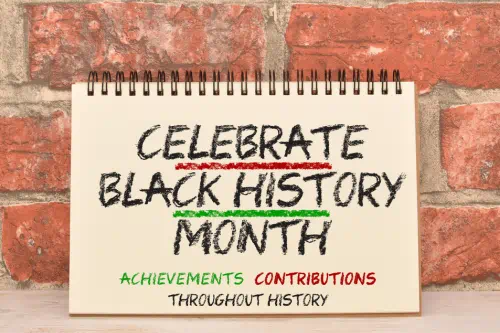“Those who have no record of what their forebears have accomplished lose the inspiration which comes from the teaching of biography and history.”
Carter G. Woodson, Historian and Founder of Black History Month
While many Americans are familiar with February as Black History Month—a time designated to recognize the history, culture, achievements, and contributions of Black Americans—some may be less certain about its history, goals, and how to meaningfully observe its significance. In a poignant description, the Public Broadcasting Service (PBS) defines Black History Month as “a celebration of legacy and the compelling stories that illuminate the diversity of Black experiences across generations.”
Black history isn’t an area to explore in February, and then put aside until the following year. Black history is American history, not a few notable events of the past. It is art, music, literature and sports. It is math, science, and technology. From history to literature, film, and community events, we offer a range of suggestions for students, teachers, parents, and others to explore this legacy in ways that build cross-cultural understanding and appreciation.
History
For those interested in the origins and development of Black History Month, consider exploring the people and factors behind the initiative:
- Carter G. Woodson, the son of former slaves and the second African American to earn a Ph.D. from Harvard University, founded Negro History Week in 1926 with the objective of ensuring an annual, nationwide observation and celebration of the Black experience, history, and legacy. Woodson launched Negro History Week in February to coincide with the birthdays of Abraham Lincoln and Frederick Douglass, two great Americans who played a prominent role in shaping black history. Still, his more encompassing goal was to change the focus from “two great men to a great race … [of] countless black men and women who had contributed to the advance of human civilization.”
- The framework of Negro History Week expanded in the 1960’s, as the national discourse on race and identity continued to evolve … to more fully represent the scope and experience of Black history, life, and culture.
- President Gerald Ford officially recognized Black History Month during the U.S. Bicentennial celebration in 1976.
- Since 1928, each Negro History Week (and subsequent Black History Month) has used a theme “to focus the attention of the public … [on] important developments that merit emphasis.” Annual themes from 1928 to 2025 can be seen here.
The following curriculum projects provide a long view of Black history in America, with impactful lessons that may be missing from many American History textbooks and curricula:
- The 1619 Project, which “challenges us to reframe U.S. history by marking the year when the first enslaved Africans arrived on Virginia soil as our nation’s foundational date.”
- 400 Years of Inequality, which includes “a discussion of identity and community, a reflection on the 400 years of inequality, a meditation of one’s place in this history, and a call to conduct a place-based observance of this moment as a way to pause and consider what kind of future we want to create collectively.”
For more on Black history:
- Information on influential Black leaders is available by name, place, events, speeches, groups and organizations, etc. in this online encyclopedia on African American and Global African history.
- Explore the stories of people of African descent in the American Revolution.
- Videos and interviews from Black Liberation and the Vietnam War chronicle the experience of Black servicemen during the Vietnam War.
- More valuable online resources for students, teachers and families can be found at A People’s Journey, A Nation’s Story | National Museum of African American History and Culture (click on “Learn”).
Print and Film
Books, documentaries, and movies can be excellent sources of information and inspiration while facilitating student-student, student-teacher, and parent-child discussions:
- Through this earlier contribution to the Blog, readers can access a list of movies and books, categorized by fiction, non-fiction, and age-range (toddler to adult).
- Explore the rich tradition of African American poetry. Due to the topic, some Black history poems include references to slavery, violence, and death and should therefore be previewed for age appropriateness.
- Many Elementary students enjoy the Who Was/Is series, in which a range of books related to Black history are available. As a means for helping students comprehend, reflect upon, and discuss information they read in narrative nonfiction books such as these, teachers might be interested in strategies from Illuminating the Power of Long Form Nonfiction to Build Reading Stamina.
- Older students and adults can “discover unique perspectives and rich narratives reflecting diverse experiences and cultural histories” through books and stories written by black authors as well as films and documentaries by Black filmmakers.
- PBS offers extensive programming that explores Black heritage, cultural icons, family bonds, and more, bringing forth inspiring content that honors the richness of the community.
Community
Community events can promote knowledge through experience—knowledge that is often overlooked or discounted in textbooks and other curricula. These events can also inform and educate about the specific historical and cultural issues—be they challenges, achievements, or day-to-day experiences—of Black Americans in your community. Following are some community-based options:
- Attend community events sponsored by your local municipality, library, university, or museum. Region-specific events such as these can be found in many communities.
- Support Black-owned businesses such as local or online shops, restaurants, and services, thereby contributing to greater diversity in the marketplace and help[ing to] create opportunities for underrepresented communities. Learn about specific Black-owned businesses with this city guide, or this site for online shopping.
Closing Thoughts for Teachers
Even with the best intentions, teachers might sometimes unknowingly construct a set of lessons that end up as harmful to students’ learning—lessons that are legitimized as teaching [but may] compromise the intellectual or psychological well-being of learners. Teachers are strongly encouraged, therefore, to examine curriculum that could, unwittingly, contribute to a “deep … discord between the accurate historical narratives of groups of people and how their histories are being taught and absorbed in school.”
Parents and teachers are encouraged to go beyond reading a story or two during the month of February and delve more deeply into Black history—American or global—as it relates to other areas across the curriculum—literature, math and science, and the arts, for example. One of the most important elements of culturally responsive pedagogy is that all students see themselves reflected in every area of the curriculum. Instead of a temporary “Black history” shelf in your classroom library, consider placing books about George Washington Carver and Mae Carol Jemison on the science shelf; Amanda Gorman and Langston Hughes on the poetry shelf; books about Black artists, musicians, mathematicians, and sports figures on their respective shelves. Or include books about people representing all the students in the class (and beyond) on your biography shelf.
While February reminds teachers to include Black history in their curricula, culturally responsive educators continually engage in the thoughtful cultivation and internalization of cultural competence necessary for developing and delivering curriculum that meaningfully reflects every student in their classroom, across disciplines, during every month of the school year.


